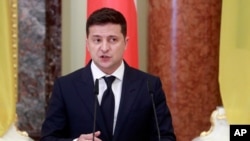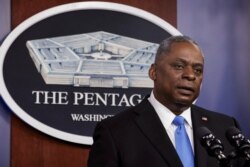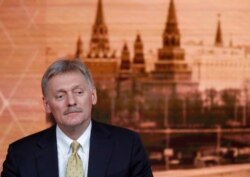Ukrainian President Volodymyr Zelensky on Thursday accused Moscow of building up troops on his country's border as the United States warned Russia against "intimidating" Ukraine.
Kyiv has been locked in a conflict with Russian-backed separatists since 2014, and this week Ukrainian officials reported Russian troop movement in annexed Crimea and on the border, near territories controlled by Moscow-backed separatists.
On Thursday, Zelensky's ministers discussed the escalating security situation with Western allies, including U.S. Secretary of Defense Lloyd Austin.
Zelensky said in a statement that "military exercises and possible provocations along the border are traditional Russian games." He accused Moscow of seeking to create "a threatening atmosphere" as Kyiv hopes to resume a cease-fire brokered last year.
The U.S. State Department said it was "absolutely concerned by recent escalations of Russian aggressive and provocative actions in eastern Ukraine."
"What we would object to are aggressive actions that have an intent of intimidating, of threatening, our partner Ukraine," State Department spokesman Ned Price told reporters.
Some observers said the reported Russian troop buildup was a test for the administration of U.S. President Joe Biden, who caused an uproar in Moscow last month by calling his Russian counterpart Vladimir Putin a "killer."
This week, Moscow and Kyiv blamed each other for a rise in violence between government forces and Kremlin-backed separatists in eastern Ukraine, which has undermined the cease-fire.
Zelensky said 20 Ukrainian servicemen had been killed and 57 wounded since the start of the year.
Separately, the military announced that a Ukrainian soldier had been wounded in an attack it blamed on separatists.
'Ready for an offensive'
On Thursday, U.S. defense chief Austin called his Ukrainian counterpart, Andriy Taran, Ukraine's defense ministry said.
Austin said during the call that Washington would "not leave Ukraine alone in the event of escalating Russian aggression," the ministry said.
Ukrainian Foreign Minister Dmytro Kuleba, for his part, discussed the "aggravation by the Russian Federation of the security situation" on the front line with his Canadian counterpart, Marc Garneau.
Ukraine's military intelligence accused Russia of preparing to "expand its military presence" in the separatist-controlled eastern regions of Donetsk and Lugansk.
In a statement, the intelligence service said it "does not rule out" an attempt by Russian forces to move "deep into Ukrainian territory."
A high-ranking Ukrainian government official, speaking on condition of anonymity, claimed that the Russian army was practicing "military coordination" with separatists.
"From mid-April their combat units will be ready for an offensive," the official told AFP.
West shouldn't 'worry'
Moscow has repeatedly denied sending troops and arms to buttress the separatists, and Putin's spokesman stressed on Thursday that Moscow was at liberty to move troops across its territory.
"The Russian Federation moves its armed forces within its territory at its discretion," spokesman Dmitry Peskov told reporters, but he did not directly confirm a troop buildup on the Ukrainian border.
He added that "it should not worry anyone and does not pose a threat to anyone."
The war in eastern Ukraine broke out in 2014 when Russia annexed the Crimean Peninsula following a bloody uprising that ousted Ukraine's Kremlin-friendly president, Viktor Yanukovych.
On Wednesday, the Pentagon said U.S. forces in Europe had raised their alert status following the "recent escalations of Russian aggression in eastern Ukraine."
Mark Milley, chairman of the U.S. Joint Chiefs of Staff, also spoke with his Russian and Ukrainian counterparts, Valery Gerasimov and Ruslan Khomchak.
Khomchak said this week that 28,000 separatist fighters and "more than 2,000 Russian military instructors and advisers" were currently stationed in eastern Ukraine.
On Thursday, the deputy head of Zelensky's office, Roman Mashovets, called for joint drills with NATO forces to "help stabilize the security situation."
Zelensky was elected in 2019 promising to end the years-long conflict, but critics say a shaky cease-fire was his only tangible achievement.
The fighting has claimed more than 13,000 lives since 2014, according to the United Nations.






